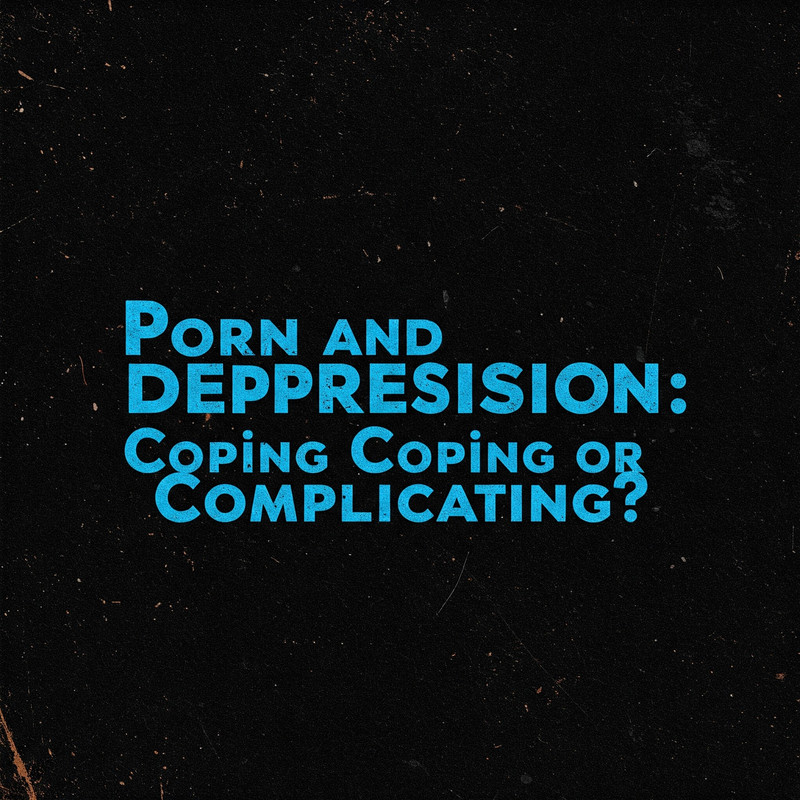Porn and Depression: Coping or Complicating?
Depression affects millions of people worldwide, often leading them to seek various forms of relief from persistent low mood, emptiness, and emotional pain. For some individuals, pornography becomes part of this coping landscape – a temporary escape from depressive symptoms. Yet this relationship is complex and potentially problematic, raising important questions about whether pornography use ultimately helps manage depression or further complicates recovery.
The Depression-Pornography
Connection
The relationship between
depression and pornography consumption typically manifests in several patterns:
Pornography as Temporary
Relief
For many people experiencing
depression, pornography offers a brief neurochemical shift that can temporarily
alleviate symptoms:
- The dopamine release during pornography viewing
provides a momentary pleasure boost in an otherwise flat emotional
landscape
- Sexual arousal and release can briefly reduce
stress and tension
- Immersion in pornographic content offers escape
from rumination and negative thoughts
- The ritual of viewing creates a predictable source
of stimulation when little else feels rewarding
This temporary relief can make
pornography particularly appealing when depression makes other activities feel
overwhelming or unrewarding.
When Depression Drives
Problematic Use
The very nature of depression can
create conditions that promote problematic pornography consumption:
- Emotional numbing: Depression often blunts
emotional responses, potentially leading to seeking more intense or novel
pornographic content for stimulation
- Social withdrawal: As depression reduces
social engagement, pornography may replace human connection
- Reduced impulse control: Depression can
impair decision-making and self-regulation
- Negative self-image: Feelings of
worthlessness may reduce motivation to change consumption patterns
- Anhedonia: When depression diminishes
pleasure in everyday activities, pornography may become one of few
remaining sources of stimulation
When Pornography May Worsen
Depression
While pornography might provide
temporary relief, research suggests several mechanisms through which it could
potentially exacerbate depression for some individuals:
The After-Effects
Many users report experiencing
negative emotions following pornography use, particularly when consumption
conflicts with personal values or feels excessive:
- Post-consumption guilt: Especially common
among those whose pornography use conflicts with religious, cultural, or
personal values
- Shame cycle: Repeated patterns of resolve, relapse, and self-criticism that reinforce negative self-perception
- Empty stimulation: The realization that the
brief pleasure doesn't address underlying emotional needs
- Relationship complications: Strains on
intimate relationships when pornography use becomes problematic or
secretive
Disruption of Natural Reward
Systems
Frequent pornography consumption
may affect how the brain processes rewards and pleasure:
- High-intensity stimulation may decrease sensitivity
to everyday pleasures
- The effortless nature of digital sexual content
contrasts sharply with the effort required by activities that build
lasting well-being
- Time spent consuming pornography may displace
activities known to combat depression, like exercise, social connection,
and meaningful accomplishment
The Complicating Factor:
Self-Medication
Many individuals with depression
unconsciously use pornography as a form of self-medication—a way to manage
symptoms without addressing root causes. This pattern is particularly
challenging because:
- The temporary relief reinforces the behavior
- It can delay seeking more effective depression
treatments
- The relief becomes progressively shorter-lived over
time
- It may create additional problems that compound
depression
Finding Healthier Approaches
For those concerned about the
intersection of depression and pornography use, several approaches may help:
Addressing Depression Directly
- Professional treatment: Therapy, medication,
or a combination can address underlying depression
- Lifestyle foundations: Regular exercise,
consistent sleep, healthy nutrition, and social connection form the
foundation of mental well-being
- Meaningful engagement: Finding purpose and
meaning through work, volunteering, or creative pursuits
- Mindfulness practices: Learning to be present with difficult emotions rather than escaping them
Developing a Healthier
Relationship with Pornography
- Conscious consumption: Being intentional
about when, why, and how often pornography is used
- Values alignment: Ensuring pornography use
aligns with personal values about sexuality and relationships
- Healthy boundaries: Creating clear personal
guidelines around consumption
- Alternative coping strategies: Developing a
diverse toolkit of depression management techniques
When More Support Is Needed
Consider professional help if:
- Depression symptoms persist or worsen
- Pornography use feels compulsive or out of control
- Significant relationship problems develop around
pornography use
- Attempts to change consumption patterns have been
unsuccessful
A Nuanced Conversation
The relationship between
pornography and depression resists simple characterization. Its impact varies
widely based on:
- Individual values and beliefs
- Frequency and context of use
- Content being consumed
- Relationship status and quality
- Pre-existing mental health conditions
- Available alternative coping strategies
This complexity demands a nuanced, non-judgmental approach that considers both the potential temporary benefits and longer-term complications.
Moving Toward Sustainable
Well-being
While pornography might offer
momentary relief from depression, sustainable mental health typically requires
addressing root causes and developing coping strategies that build rather than
deplete psychological resources. For many experiencing depression, this means
working with mental health professionals to develop comprehensive treatment
approaches that address both the depression itself and any potentially
problematic coping mechanisms.
The goal isn't necessarily
eliminating pornography entirely, but rather ensuring it doesn't interfere with
recovery from depression or become an obstacle to developing more sustainable
sources of connection, meaning, and pleasure.
By understanding the complex
relationship between pornography and depression, individuals can make more
informed choices about their consumption patterns and seek appropriate support
when needed.

Comments
Post a Comment